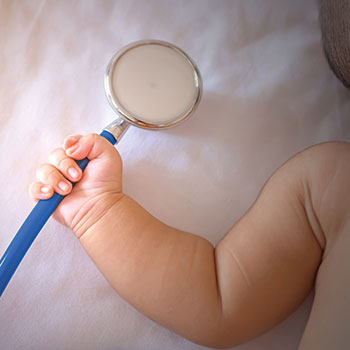Becoming a physician and a parent
Through research and advocacy, physician-parents are pushing for changes to the challenges of starting a family during training.
Sharing the news that you're expecting a baby should be a joyful experience. But for medical trainees, it's often not.
“I really feel that's a universal thing, with both of my pregnancies and talking to other residents and fellows, that telling your program, you feel guilty. You feel like, ‘Oh no, I'm going to mess up their schedule,’” said Vanessa Van Doren, MD, an ACP Resident/Fellow Member and an infectious diseases fellow at Emory University in Atlanta.

Isabel Huang, MD, echoed the sentiment. “I came to [my program director] very distraught, like ‘I'm so sorry. I'm pregnant,’ which was not a good feeling to have,” said Dr. Huang, who is now an assistant professor in the department of physical medicine and rehabilitation at UT Southwestern in Dallas.
Happily, for both trainees, their program directors responded positively. “He turned it all around for me. He said, ‘You need to stop apologizing. Pregnancy is happy. I'm excited for you. Don't worry, we will work on figuring out the situation,’” said Dr. Huang.
“Both my residency program director and my current program director for infectious diseases were very supportive,” said Dr. Van Doren, who had her first child during her third year of residency and her second this summer.
Yet even with the support of supervisors, they encountered a number of challenges starting a family during training, from leave and child care to pumping breast milk and finishing training on time. Through research and advocacy, they and other physician-parents are drawing attention to these widespread issues and pushing for changes.
Shared difficulties
Dr. Huang confirmed the commonality of the challenges facing new parents in residency in a survey of 844 physician mothers, the results of which were published in 2019 by JAMA Network Open.
“It was exactly what I had experienced,” she said. “The most frequent negative experience that they noted [about returning to work] was that they had a hard time finding pumping areas.” About a third of first-time mothers reported problems finding an appropriate space, and almost half lacked time for pumping.
To overcome the time problem, lactating residents need space that is both private and set up for work, advocates said. “I've had great areas where I've had accommodations. I've had other areas in the hospital where I went and there wasn't even a computer or a phone that I could use,” said Courtney Harris, MD, FACP, now an infectious diseases specialist at the Medical University of South Carolina in Charleston.
In addition to space and time, lactating physicians face the issue of cold milk storage, “figuring out where the safe spaces are where no one's going to touch it, move it,” she added.
Dr. Harris and her colleagues on ACP's Council of Resident and Fellow Members, including Dr. Van Doren, took action on these concerns, sponsoring a resolution on lactation that was passed by the College's Board of Regents on June 6.
In the statement, ACP calls for trainees and physicians to be provided with clean, private lactation space in close proximity to workspaces, equipped with electricity and tools that allow for productivity such as internet and network access, phones, and computers connected to the hospital or clinic system, as well as secure storage for milk and pumping supplies and paid, protected time for lactation as applicable.
Dr. Harris hopes that ACP's support will push more residency and fellowship programs to join those that have already taken the lead on this issue. “There are so many programs that are doing so well,” she said, noting that Mayo Clinic, where she completed residency, had a gift bag for new trainee mothers returning from leave which included resources for new parents and stickers to reserve rooms for pumping.
“But there are so many programs that have no policies, no support, no infrastructure. That variability has led a lot of us to feel super passionately about this issue,” she added.
She and other advocates are also passionate about adequate parental leave. In Dr. Huang's survey, 73% of physician mothers felt that their leave was insufficient. Another 2019 study, published by Academic Medicine, found wide variation in the maternity leave residents took, ranging from two weeks to 40.
When Dr. Huang had her babies in 2013 and 2015, residents on her program were required to use their six weeks of vacation time as maternity leave. She added on two unpaid weeks “so I took off eight weeks total for my children,” she said. “That entire year that I was pregnant, I did not have any other vacation time.”
She's pleased that her trainees will have it at least a little easier. In July 2022, the Accreditation Council for Graduate Medical Education (ACGME) changed its policy to mandate that all participating institutions provide residents and fellows with a minimum of six weeks of paid medical, parental, and caregiver leave, which is counted separately from vacation.
The benefits of at least that much leave are “really obvious,” said Dr. Van Doren. “Giving parents more time to bond with their kids, to figure out breastfeeding, to get a handle on sleep deprivation.” While on ACP's Council of Resident and Fellow Members, she wrote a resolution calling for 12 weeks of paid parental leave.
“We know it's feasible because other countries do it,” she said. “Trainees in Canada, for example, get a year off.” Her proposal to the College is still under study, in part because the ACGME so recently changed their policy, she said.
Short leaves contribute to one of the other big challenges facing resident parents—finding child care. Niti Vaid, DO, FACP, had the first of her four children just a month before she started her internship year at Stamford Hospital in Connecticut.
“This particular program had an on-site day care that would take babies as young as six weeks,” said Dr. Vaid, who is now a general internal medicine physician in Westlake Village, Calif. “I was just lucky.” The facility being at the hospital also helped with the common challenge of finding care that matches trainee work hours.
More than a third of respondents to Dr. Huang's survey reported difficulty finding child care, which did not surprise her. “Most of these day cares have a two-year or three-year waitlist,” she said.
For anyone training to be a doctor, planning that far ahead can be impossible. “It's almost like you start from scratch every four years. You finish med school where you've made your little community, and then a computer system tells you where you're going,” Dr. Huang said. “You're just happy to get in somewhere you like.”
Taking a longer leave that is unpaid can also be difficult, given the mounting expenses of residency, including housing and student loans, on a typical resident's relatively low salary, the experts noted.
There's another big downside of extended leave from residency and/or fellowship, noted Dr. Harris. “If you take 12 weeks of parental leave on a one-year fellowship, does that mean you have to extend your fellowship?” she said. “[The American Board of Internal Medicine] has very strict policies on how long you can be away. I remember being a chief resident and counting the days so our program could tell the women we were working with exactly how many days they could miss and sit for boards.”
Dr. Huang dealt with the same issue. “I felt prepared to take the boards, but my program director asked me to make up a little bit of extra time for the time off,” she said. “Then that caused me to miss the deadline for the boards for that year.”
Thinking about solutions
It wouldn't be such a stretch for the academic medical system to make changes in response to these problems, Dr. Harris noted. “There are some groups and some researchers who are advocating for more of a competency-based model,” she said. “Policy could allow some more flexibility for program directors to decide ‘Do you feel this resident is competent? If you do, they can sit for boards.’”
In the absence of such broad changes, it's helpful for residency program leaders to at least consider the issues of resident parents before they come up. “When I interviewed for my fellowship and then subsequently my first job, a lot of places didn't have a clear answer for me [about parental leave]. Either they hadn't thought about it, or there's no formal policy,” said Dr. Harris. “In order to recruit great women, you really have to highlight how you plan to support women.” She chose a fellowship where parental leave was mentioned during her interview.
That's an easy step, noted Ariela Marshall, MD, ACP Member, a hematologist at the University of Minnesota in Minneapolis. “Say right off the bat during the interview process, ‘Hey, here is what our parental leave structure looks like and we guarantee that every person who has a child during residency has full access to this without any negative consequences,’” she said.
More communication by program leaders is also helpful after a trainee is pregnant, the advocates agreed. “Times have changed a lot since I was in residency 20 years ago,” said Dr. Vaid. “You were there to further your medical education and they really didn't want to hear or know or even care about your personal life.”
In contrast to the old ways, Dr. Huang recommends program leaders have an early sit-down with a pregnant trainee, “asking them, ‘How's your pregnancy been? What do you expect leave to look like?’”
Residents might need some accommodations even during pregnancy, Dr. Van Doren pointed out. “It's hard to balance taking care of yourself when you're pregnant and taking care of your patients,” she said. “There's some evidence that working over 12-hour shifts in the third trimester is associated with bad outcomes for the mom and the baby.”
Asking about a physician-parent's well-being is also important after birth, according to Dr. Harris. “If you have a trainee or even another faculty member that you work with, checking in with them to see, when they come back to work, do they need anything?” she said. “I had a couple of colleagues who would text me, ‘Hey, are you doing OK? Can I grab you a coffee? I'll see this extra patient while you go pump.’”
Complications
Who sees the extra patients is one of the trickiest issues in accommodating residents who are becoming parents, the experts agreed. “Some programs have a small number of residents, so the coverage piece is difficult. I don't really have a great answer,” said Dr. Huang.
Some advocates have ideas, though. “I think we should be paying people to moonlight to cover rather than saying, ‘Oh, well, the rest of the residents have to pitch in,’” said Dr. Marshall. “There has to be some way of doing this in an equitable fashion.”
On Dr. Harris's fellowship, it was the attending who picked up the extra work. “We see most of our patients together. She didn't want all the extra work to fall solely on my co-fellows and saw all of our patients, keeping me in the loop and updated, and I think that's the absolute role model of what faculty should do for a trainee.”
Faculty are a big determinant of how open a residency program's culture is to childbearing, the physician-parents agreed. “You can see how it permeates the way attendings interact with you even when you're on a very hard rotation, acknowledging that it's hard or being OK with you managing rounds in a way that gives you a good shot at getting home for dinner or picking up your child from day care,” said Dr. Van Doren.
A culture that welcomes residents having children could go a long way to solving another problem that's been getting increasing attention in medicine. A recent survey of more than 3,000 physicians and medical students found that 60% delayed childbearing due to training, and 55.8% regretted doing so. More than 20% reported having problems with infertility, according to results published by JAMA Internal Medicine on July 24.
Dr. Marshall can sympathize. “I didn't even think about having children until I was done with my training and into my early academic career,” she said. “It was not too late, but I was going to have a big struggle with infertility that I had previously not really even considered because no one had ever talked about it.”
To help others avoid the same situation, she's involved in the American Medical Women's Association's Physician Infertility Initiative, which calls for more education, support, and advocacy on the issue, as well as coverage for treatments.
“Residency programs and hospitals should be supporting people who want to freeze their eggs or embryos, and I think there are a lot of programs that are starting to look into this,” Dr. Marshall said, noting that the University of Pennsylvania in Philadelphia, where she was a resident, has started covering about $30,000 worth of elective fertility preservation for their residents.
Of course, that is a cost out of reach of most Americans, and the advocates of better parental policies for trainees noted that they'd like to see changes on a much broader level, not just in medicine.
“I'm trying to affect things here, but this should all be offered to everyone as a national policy,” said Dr. Van Doren. “As difficult as it's been for me as a trainee, I think it's probably infinitely more difficult if you're working at a minimum-wage job with no health insurance or accommodations.”




